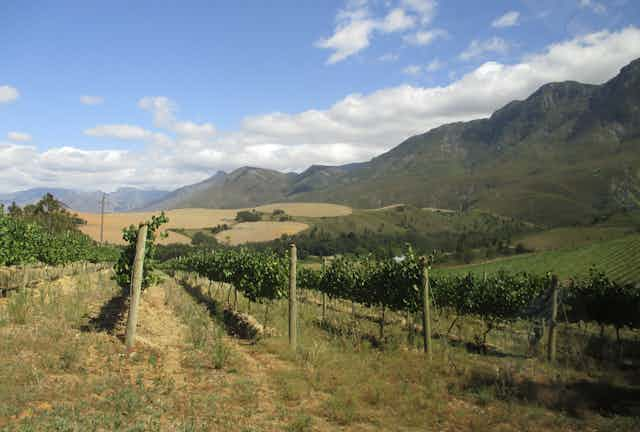Whether they are winemakers, winery owners, cellar managers or sommeliers, women entrepreneurs are increasingly entering the wine industry, evolving in this traditionally masculine world. This trend is noticeable in both the old world and new world wine-producing countries.
Over the last three years, we conducted several studies and conferences in South Africa and France that provided a range of observations and analysis.

In South Africa’s Cape region, we discovered the importance given by women in the wine industry to promoting the social and economic development and integration of less-educated women. One example is Irène de Fleuriot Waller, from La Bri Estate in Franshhoek, who employs a team of women in her boutique.
Samantha O'Keefe, owner of Lismore Estate in Greyton, always hires women for specific times and tasks during the harvests. In so doing, they contribute to the economic integration and empowerment of women in South Africa. Another example is Hanneli Smit, founder of VinLab, who employs and manages a woman-only team. For her, this choice is simpler.

In a 2016 study on entrepreneurs in the French wine industry, we found that collaboration and peer support plays an important role. Those interviewed collaborate and partner with multiple stakeholders, enhancing the development of their business. In particular, they built links with those who share a common identity as well as similar practices and/or geographical proximity. Peer support is based on sharing experiences, practices, common and complementary knowledge.
Working with other wine entrepreneurs allows them to generate ideas that they would not have had otherwise. More specifically, women in the wine industry rely on shared communities such as DiVINes d’Alsace. Céline Metz of Hubert Metz Estate says: “Collaborations and exchanges allow us to gain agility and reactivity”. These communities favour mutual assistance, creating synergies. These “entrepreneurial collaborations” often transform themselves into long-term bonds that benefits all, as highlighted Christina Augarde from Château Peyrelongue: “Entrepreneurship is a collective job”.

Uncertainty as a driver of adaptation
With diverse backgrounds, women wine entrepreneurs create their projects based on their personal identity and personality. They build on their assets and rely on skills acquired during their studies and/or previous professional achievements, thus opening themselves to the field of possibilities.
Uncertainty is inherent to wine business but it is considered by women wine entrepreneurs, both in France and in South Africa, as a springboard for their entrepreneurial project development. Nature is sometimes unpredictable but Nadia Barnard, winemaker at the Waterkloof Estate in Somerset West focuses on simple aspects: being present, and tasting the wine.
As Carla Pauw, founder of Saltare Wines, says: “You have only one chance in a year to make the wine and it takes time. Control what you can”.
Uncertainty can be uncomfortable, but as points out Christina Augarde of Château Peyrelongue in Saint Emilion: “It should not be seen as an obstacle in itself, but a driving force for adaptation”. This allows women wine entrepreneurs to unlearn habits and be able to evolve toward new ways of working and thinking.
Work-life balance: international similarities
Work-life balance can be difficult in the wine industry since personal and professional space can be intermingled – wine entrepreneurs often live on their estates, after all. The overall objective for those interviewed, in both France and South Africa, is to find some kind of balance – even if this balance does not mean the same for all women.
Those interviewed said that they often struggle to find time for themselves, between their professional responsibilities and personal time. This is what is shared by Ntsiki Biyela, founder of Aslina Wines: “It is a necessity to take time for ourselves, even if it’s not simple”.

For some women we met, wine is a family story: Jocelyn Hogan Wilson started Hogan Wines with her father and took a sabbatical year when she had her second child. Says Nina-Mari Bruwer: “The more you do, the more you get done”, meaning that, as a working mother of two and co-owner of a winery, you always have something to take care of. Her father owned a cellar and her husband is the sixth generation of Mont Blois winery in Robertson.
Resilience, creativity and innovation
Women wine entrepreneurs are also able to assess what they are willing to lose when facing difficult choices. Says Ntsiki Biyela: “It is necessary not to focus on the ‘what ifs’ that don’t make you go forward”. By making sense and transforming one’s environment, it makes it possible to be an actor of one’s future. “Opportunities are like a wheel, you have to be ready to take them”, said VinLab’s Hanneli Smit. By learning how to recognise and seize opportunities, the entrepreneurs interviewed reduced uncertainty, enhanced their creativity and built their resilience, allowing them to pursue their entrepreneurial projects more efficiently.

Ronell Wiid, from Bartinney Wines, goes even further: “Creativity is a way to deal with uncertainty”.
The Covid-19 pandemic has encouraged wineries to rethink their business models. Céline Metz has integrated digital marketing innovations in the Hubert Metz Estate’s wine tourism by creating a virtual wine-tasting experience. When customers buy six bottles, they can attend an online tasting session with Céline explaining the different wines. In so doing, she says she was able to “change lemon into lemonade”, leveraging events outside of her control. For women wine entrepreneurs, action and creativity are ways of dealing with uncertainty.


